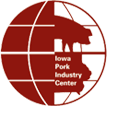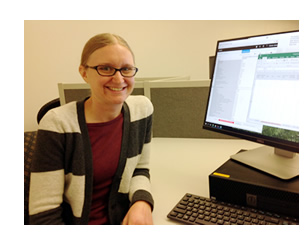 From Iowa State University to her home farm, she’s worked with a variety of people and taken on a multitude of responsibilities. This new role will allow her to use strengths and skills she’s developed along the way.
From Iowa State University to her home farm, she’s worked with a variety of people and taken on a multitude of responsibilities. This new role will allow her to use strengths and skills she’s developed along the way.
“In this position, I hope to play a role in identifying current needs of hog farmers and developing strategies to address them,” Chipman said. “I will be collecting data for specific projects as well as creating material to disseminate the information we have found.”

 Chipman said she was interested in this position because it will tap into her motivations and use her experiences and skills well.
Chipman said she was interested in this position because it will tap into her motivations and use her experiences and skills well.
“I loved the idea of being connected to both the academic research and the commercial industry,” she said. “I really enjoy learning and working to solve problems which can be translated into a format relevant for others.”
Chipman earned her undergraduate degree at Iowa State in animal science and then worked in the same department for more than four years as research program coordinator for Dr. John Patience. She then returned to her family’s operation near Harlan in southwest Iowa to work with her dad and older brother. She managed the farm feed mill, monitored their contract nurseries and finishers, and helped with general overall management responsibilities.
“I see this position as offering a place where I can serve the industry that I have grown to love,” she said. “I understand the challenge farmers face to get information needed to address the day-to-day issues that arise in this fast-paced industry, and I would love to spend time where they cannot, gathering information and putting it in a form that is easily accessible.”
Her first priority is with a National Pork Board funded project on pelvic organ prolapse, a current issue facing operations of all sizes.
“I’m excited to connect with more producers, and industry stakeholders especially, as I begin working on the sow pelvic organ prolapse project,” Chipman said. “So many sow farms have seen an increase in prolapse incidence, but no one has a good answer regarding the root cause. With this project, I hope to give some clarity to the industry regarding this problem that impacts animal welfare, worker morale and the economic bottom line. Farms of all sizes are seeing an increased prolapse incidence so the work could easily benefit small farms just as much as larger production companies.”
As research program coordinator for John Patience, Chipman learned and appreciated the importance of maintaining high data quality and interacting with industry stakeholders. Now, as IPIC extension swine program specialist, she’ll be able to building on existing relationships and develop new cooperative connections with faculty, staff, students and others in the industry.
December 2017 - Iowa State University



